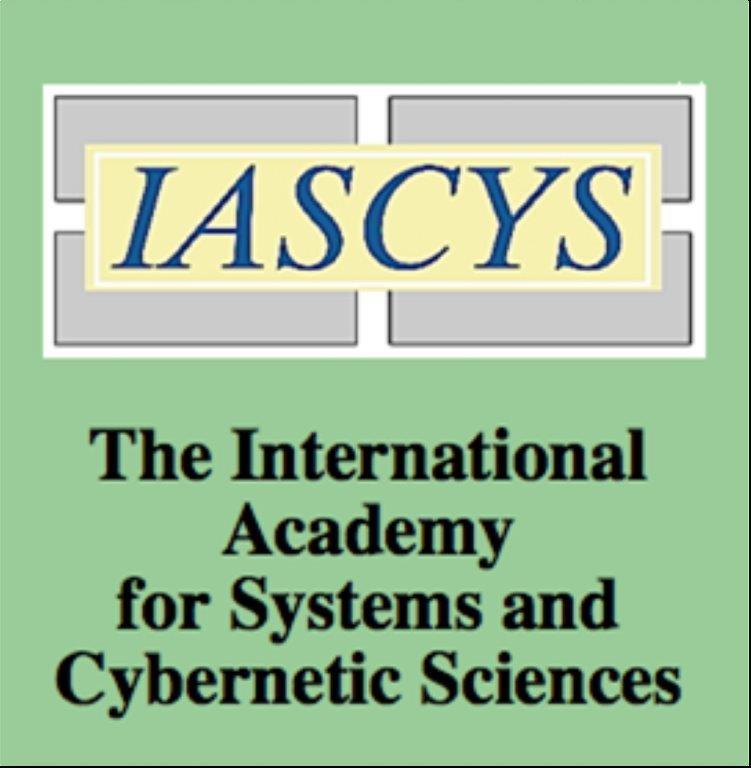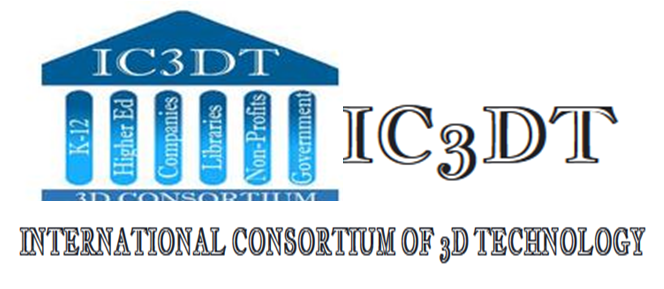Proceedings of the 13th International
Multi-Conference on
Society, Cybernetics and Informatics: IMSCI 2019
FOREWORD
Informatics and Cybernetics (communication and control)
are having an increasing impact on societies and in the globalization
process that is integrating them. Societies are trying to regulate this
impact, and adapt it to their respective cultural infra-structures. Societies
and cultures are in reciprocal co-adaptations with Information and Communication
Technologies. Synergic relationships might emerge in this co-adaptation
process by means of positive and negative feedback loops, as well as feedforward
ones. This would make the whole larger than the sum of its parts, generating
emergent properties in the parts involved as well as in the whole coming
forth. The academic, private, and public sectors are integrating their
activities; multi-disciplinary groups and inter-disciplinary teams are
being formed, and collaborative research and development projects are
being organized in order to facilitate and adequately orient the design
and implementation of the feedback and the feedforward loops, and potentially
generating synergic relationships. This phenomenon persuaded the Organizing
Committee to organize The 13th International Multi-Conference
on Society, Cybernetics and Informatics (IMSCI 2019) in a multi-disciplinary
context along with other collocated events. Consequently, participants
may focus on one discipline, while allowing them the possibility of attending
conferences from other disciplines. This systemic approach stimulates
cross-fertilization among different disciplines, inspiring scholars, originating
new hypothesis, supporting production of innovations and generating analogical
thinking.
IMSCI 2019 was organized and sponsored by the International Institute of Informatics and Systemics (IIIS, www.iiis.org), member of the International Federation of Systems Research (IFSR). The IIIS is a multi-disciplinary organization for inter-disciplinary communication and integration, which includes about 5000 members. Consequently, a main purpose of the IIIS is to foster knowledge integration processes, interdisciplinary communication, and integration of academic activities. Based on: 1) the transdisciplinarity of the systemic approach and its emphasis on relationships and integrating processes, and 2) the multi-disciplinary support of cybernetics’ and informatics’ concepts, notions, theories, technologies, and tools, the IIIS has been organizing multi-disciplinary conferences as a platform for fostering inter-disciplinary communication and knowledge integration processes.
One of the main purposes of IMSCI 2019 is to bring together academics, professionals, and managers from the private and the public sectors, in order to share ideas, results of research, and innovative services or products, in a multi-disciplinary and multi-sector forum. Educational technologies, socioeconomic organizations, and sociopolitical processes are essential domains among those involved in the evolving co-adaptation and co-transformation between societies and cultures on the one hand, and between informatics and cybernetics (communication and control) on the other hand. Consequently, the main conference in the context of the IMSCI 2019 Multi-Conference is the 17th International Conference on Education and Information Systems, Technologies and Applications: EISTA 2019. The relationship between education/training and Information and Communication Technologies (ICT) is quickly intensifying and sometimes appears in unexpected forms and in combination with original ideas, innovative tools, methodologies, and synergies. Accordingly, the primary purpose of EISTA 2019 has been to bring together researchers and practitioners from both areas together to support the emerging bridge between education/training and the ICT communities.
In the context of EISTA 2019, practitioners and consultants were invited to present case studies and innovative solutions. Corporations were invited to present education/training information systems and software-based solutions. Teachers and professors were invited to present case studies, specifically developed information systems, and innovative ideas and designs. Educational scientists and technologists were invited to present research or position papers on the impact and the future possibilities of ICT in educational systems, training processes, and methodologies. Managers of educational organizations and training consultants were invited to present problems that might be solved with ICT or solutions that might be improved by different approaches and designs in ICT.
EISTA 2019 provides a forum for the presentation of solutions and problems in the application of ICT in the fields of education/training. Authors of the papers included in the proceedings provided diverse answers to the following questions:
On behalf of the Organizing Committees, I extend our heartfelt thanks to:
A total of 977 reviews made by 441 reviewers (who made at least one review), from 66 countries, contributed to the quality achieved in IMSCI 2019. This means an average of 11.10 reviews per submission (88 submissions were received). Each registered author had access, via the conference web site, to the reviews that recommended the acceptance of their respective submissions. Each registered author could also get information about: 1) the average of the reviewers evaluations according to 8 criteria, and the average of a global evaluation of his/her submission; and 2) the comments and the constructive feedback made by the reviewers, who recommended the acceptance of his/her submission, so the author would be able to improve the final version of the paper.
In the organizational process of IMSCI 2019, about 88 articles were submitted. These post-conference proceedings include about 43 papers, from 23 countries that were accepted for presentation (43 countries taking into account the presentations in collocated events). We extend our thanks to co-chairs special tracks organizers for their support. The submissions were reviewed as carefully as time permitted; it is expected that most of them will appear in a more polished and complete form in scientific journals.
This information about IMSCI 2019 is summarized in the following table, along with the other collocated conferences:
All submissions were peer reviewed by the two-tier reviewing methodology of the International Institute of Informatics and Systemics (IIIS, www.iiis.org). As it might be noticed, from the table above, 11.10 reviews were made, in average, for each submission we received. After the conference is over, the names of the reviewers will be published on the IIIS web site along with the titles of the papers each reviewer reviewed. This means that what had been a double-blind review, up to the conference, is transformed to single-blind review, after the conference is over. In this way, each author would have information about the names of the reviewers of his/her submission, but not vice-versa. Likewise, each author would know how many reviewers reviewed his/her submission and relate it to the average, being informed in the above table, of 11.10 reviews per paper.
Our two-tier reviewing methodology meet two different objectives of peer-review: 1) to improve the paper via non-anonymous reviewers (non-blind reviews) and 2) to improve the acceptance/non-acceptance decision of the Organizing Committee via traditional anonymous reviewers (double-blind reviews) A recommendation to accept, made by non-anonymous reviews, is a necessary condition, but it is not a sufficient one. A submission, to be accepted, should also have a majority of its double-blind reviewers recommending its acceptance. These two necessary conditions generate a more reliable and rigorous reviewing than any of those reviewing methods, based on just one of the indicated methods, or just on the traditional double-blind reviewing.
We extend our gratitude to the co-editors of these proceedings for the hard work, energy and eagerness they have shown in organizing their conferences and preparing their respective sessions. We express our intense gratitude to Professor William Lesso (1931-2015) for his wise, timely, adequate and valuable tutoring, as well as for for his eternal energy, integrity, and continuous support and advice, as the Program Committee Chair of past conferences, and as Honorary President of WMSCI 2019, as well as for being a very caring old friend and intellectual father to many of us. We also extend our gratitude to Professor Belkis Sánchez, who brilliantly managed the organizing process.
We would like also to extend our gratefulness to Professor Shigehiro Hashimoto for his yearly support in the last 20 years as well as for his editorial work for the journal; as well as to Professor Grandon Gill, Dr. Jeremy Horne, Professor Thomas Marlowe and Professor Matthew E. Edwards for their continuous advice and support in the conferences they participated in, along the last 12 years; as well as in the conferences they were not able to participate in. Their advices and the kind of care they provided us with are highly valued and appreciated.
We also extend our gratitude to the following scholars, researchers, and professionals who accepted to deliver plenary workshops and/or to address the audience of the General Joint Plenary Sessions with keynote addresses.
Workshops and Conversational Sessions
Professor Thomas Marlowe, Seton Hall University, USA, Department of Mathematics and Computer Science, Program Advisor for Computer Science, Doctor in Computer Science and, Doctor in Mathematics.
Professor Stuart A. Umpleby, The George Washington University, USA, President of the Executive Committee of the International Academy for Systems and Cybernetics Sciences, Former President of The American Society of Cybernetics.
Professor Matthew E. Edwards, Alabama A&M University, USA, Professor of Physics and, Former Dean, School of Arts and Sciences, Director of IHSEAR: Institute of Higher Science Education Advancement, and Research.
Professor Tatiana Medvedeva, Siberian State University of Transport, Russia, Department of World Economy and Law Former Head of the Scientific and Practical Center for Business and Management.
Dr. Bruce E. Peoples, Innovations LLC, USA, Founder and CEO, Formerly at Université Paris 8, France, Laboratoire Paragraphe, Chair Emeritus of an ISO/IEC Standards Committee, Generated over 50 Invention Disclosures, 15 Patent Applications and 11 Patent Awards.
Professor William Swart, East Carolina University, USA, FMR. Dean of Engineering and Technology at New Jersey Institute of Technology, Provost and Vice President for Academic Affairs at East Carolina University, Researcher and Consultant at NASA’s Space Shuttle.
Professor Richard Self, University of Derby, UK, The School of Computing and Mathematics, Senior Lecturer in Analytics and Governance.
Plenary Keynote Speakers
Professor Thomas Marlowe, Seton Hall University, USA, Department of Mathematics and Computer Science, Program Advisor for Computer Science, Doctor in Computer Science and, Doctor in Mathematics.
Professor Shigehiro Hashimoto, Kogakuin University, Japan, Councilor and Dean, Faculty of Engineering, Former Associate to the University President. Doctor of Engineering and Doctor of Medicine. Biomedical Engineering.
Professor Matthew E. Edwards, Alabama A&M University, USA. Professor of Physics and Former Dean of the School of Arts and Sciences. Director of IHSEAR: Institute of Higher Science Education, Advancement and Research.
Dr. Paul Page, Queen's University Belfast, UK, School of Electronics, Electrical Engineering & Computer Science, High Performance and Distributed Computing, Lecturer (Education) – Society & Community.
Professor Stuart A. Umpleby, The George Washington University, USA, President of the Executive Committee of the International Academy for Systems and Cybernetics Sciences, Former President of The American Society of Cybernetics.
Professor Tatiana Medvedeva, Siberian State University of Transport, Russia, Department of World Economy and Law Former Head of the Scientific and Practical Center for Business and Management.
Fr. Dr. Joseph Laracy, Seton Hall University, USA, College of Arts and Sciences, Department of Mathematics and Computer Science, Complex Systems, Differential Equations, and Dynamical Systems.
Dr. Russell Jay Hendel, Towson University, USA, Dept. of Mathematics. Researcher in Discrete Number Theory, the Theory of Pedagogy, Applications of Technology to Pedagogy, and the Interaction of Mathematics and the Arts.
Dr. David Cutting, Queen's University Belfast, UK, School of Electronics, Electrical Engineering and Computer Science, Course Director: BSc Software, Engineering with Digital Technology Partnership, Fellow of the Higher Education Academy.
Professor William Swart, East Carolina University, USA. FMR. Dean of Engineering and Technology at New Jersey Institute of Technology. Provost and Vice President for Academic Affairs at East Carolina University. Researcher and Consultant at NASA’s Space Shuttle.
Professor Christian Greiner, Munich University of Applied Sciences, Germany, Associate Dean Applied Research, Professor at the Department of Business Administration.
Dr. Robert Cherinka, MITRE Corporation, USA, Chief Engineer, Software Engineering Technical Center at MITRE.
Dr. Mario Lamanna, Evoelectronics, Italy and Selex-SI, USA. Senior Scientist and Project Leader, Projects in the fields of Defense and Security.
Mr. Joseph Prezzama, MITRE Corporation, USA, Co-Department Head for the Joint Operations Southeast, Tampa office of the MITRE Corporation, MS Software Engineering.
Professor Oleg I. Redkin, Saint Petersburg State University, Russia, Faculty of African and Asian Studies, Head of Arabic Studies.
Dr. Bruce E. Peoples, Innovations LLC, USA, Founder and CEO, Formerly at Université Paris 8, France, Laboratoire Paragraphe, Chair Emeritus of an ISO/IEC Standards Committee, Generated over 50 Invention Disclosures, 15 Patent Applications and 11 Patent Awards.
Professor Olga Bernikova, Saint Petersburg State University, Russia, Research Laboratory for Analysis and Modeling of Social Process. Member of the Editorial board of the journal “Islam in the Modern World”.
Professor Margit Scholl, Technical University of Wildau [FH], Germany, Faculty of Economics, Computer Science, Law, Business, and Administrative Informatics, Received a research prize from TH Wildau.
Bruce Leybourne, MS, Institute for Advance Studies on Climate Change (IASCC), USA, Research Director and Principal Investigator, MS in Geology from University of Southern Mississippi, USA, Former Navy tenure at the U.S. Naval Oceanographic Office, NASA's Stennis Space Center.
Dr. Pawel Poszytek, Foundation for the Development of the Education System, Poland. General Director, Member of working groups of the European Commission and the Ministry of National Education of Poland.
Professor Richard Self, University of Derby, UK, The School of Computing and Mathematics, Senior Lecturer in Analytics and Governance.
Dr. Yaping Gao, Quality Matters, USA, Senior Academic Director, 25 years experience in higher education both in China and in USA as faculty, and online education manager and administrator.
Dr. Tilia Stingl De Vasconcelos, Business Consultant, Austria, Member of the European, Society for Education and Communication, Previously, University of Applied Sciences Austria, Information Management and Cross Cultural Communication.
Professor Mohammad Ilyas, Florida Atlantic University, USA, Department of Computer and Electrical Engineering and Computer Science, Former Dean of the College of Engineering and Computer Science; Member of Global Engineering Deans Council.
Mg. Philipp Belcredi, Comparative-Systemic Intervention, Austria, Owner and CEO, Former CEO of Pewag Chain, Inc.
Professor Wen-Chen Hu, University of North Dakota, USA, School of Electrical Engineering & Computer Science, Former (2010-2017) editor-in-chief of the International Journal of Handheld Computing Research (IJHCR)
Professor Thomas Peisl, Munich University of Applied Sciences. Germany, Professor of International Management and Strategy, Former Marketing Director at General Electric Europe.
Professor Maritza Placencia Medina, Departamento Académico de Ciencias Dinámicas de la Universidad Nacional Mayor de San Marcos, Peru, Facultad de Medicina, Centro de Investigaciones Tecnológicas.
Professor Andrés Tremante, Florida International University, USA, Department of Mechanical and Materials Engineering.
Invited Sessions Organizers
Professor Shigehiro Hashimoto, Kogakuin University, Japan, Councilor and Dean, Faculty of Engineering, Former Associate to the University President. Doctor of Engineering and Doctor of Medicine. Biomedical Engineering.
Professor Dr. oec Natalja Lace, Riga Technical University, Faculty of Engineering, Economy and Management, Head of Department of Corporate Finance and Economics.
Many thanks to Drs. Sushil Archarya, Esther Zaretsky, and to professors Michael Savoie, Hsing-Wei Chu, Mohammad Siddique, Friedrich Welsch, Thierry Lefevre, José Vicente Carrasquero, Angel Oropeza, and José Ferrer, for chairing and supporting the organization of conferences and/or special events or tracks in the context of, or collocated with, WMSCI 2019, and previous conferences. We also wish to thank all the authors for the quality of their papers, the Program Committee members and the additional reviewers for their time and their contributions in the respective reviewing processes.
Our gratefulness is also extended to the organizations that provided scientific, academic, professional, or corporate co-sponsorships in this conference and/of previous ones. The following are among these organizations:
Special thanks to Dr. Jeremy Horne, Dr. Harvey Hyman, and Ms. Molly Youngblood Geiger (Google Partners Community Ambassador) for their efforts in helping us with the identification of above shown co-sponsors.
We extend our gratitude as well to Professor Belkis Sánchez, Eng/Mg María Sánchez, Ms. Kilian Mendez, Mr. Jhonny Romero, Mr. Jaime Noguera, and Mr. Freddy Callaos for their knowledgeable effort in supporting the organizational process, maintaining the email lists, producing the hard copy and CD versions of the proceedings, developing and maintaining the software that supports the interactions of the authors with the reviewing process and the Organizing Committee, as well as for their support in the help desk, the promotional process, and their advising role in the promotion of the conference.
Professor Nagib C. Callaos, Ph.D.
IMSCI 2019 was organized and sponsored by the International Institute of Informatics and Systemics (IIIS, www.iiis.org), member of the International Federation of Systems Research (IFSR). The IIIS is a multi-disciplinary organization for inter-disciplinary communication and integration, which includes about 5000 members. Consequently, a main purpose of the IIIS is to foster knowledge integration processes, interdisciplinary communication, and integration of academic activities. Based on: 1) the transdisciplinarity of the systemic approach and its emphasis on relationships and integrating processes, and 2) the multi-disciplinary support of cybernetics’ and informatics’ concepts, notions, theories, technologies, and tools, the IIIS has been organizing multi-disciplinary conferences as a platform for fostering inter-disciplinary communication and knowledge integration processes.
| Multi-disciplinary conferences are
organized by the IIIS as support for both intra-
and inter-disciplinary communication.
Processes of intra-disciplinary communication are mainly achieved
via traditional paper presentations in corresponding disciplines,
while conversational sessions, regarding trans- and inter-disciplinary
topics, are among the means used for inter-disciplinary communication.
Intra- and inter-disciplinary communications might generate co-regulative
cybernetic loops, via negative feedback, and synergic
relationships, via positive feedback loops, in which both kinds
of communications could increase their respective effectiveness.
Figure 1 shows at least two cybernetic loops if intra- and inter-disciplinary
are adequately related. A necessary condition for the effectiveness
of Inter-disciplinary communication is an adequate level of variety
regarding the participating disciplines. Analogical thinking
and learning processes of disciplinarians depend on it; which
in turn are potential sources of the creative tension required for
cross-fertilization among disciplines and the generations of new
hypotheses. An extended presentation regarding this issue can be
found at: www.iiis.org/MainPurpose |

|
One of the main purposes of IMSCI 2019 is to bring together academics, professionals, and managers from the private and the public sectors, in order to share ideas, results of research, and innovative services or products, in a multi-disciplinary and multi-sector forum. Educational technologies, socioeconomic organizations, and sociopolitical processes are essential domains among those involved in the evolving co-adaptation and co-transformation between societies and cultures on the one hand, and between informatics and cybernetics (communication and control) on the other hand. Consequently, the main conference in the context of the IMSCI 2019 Multi-Conference is the 17th International Conference on Education and Information Systems, Technologies and Applications: EISTA 2019. The relationship between education/training and Information and Communication Technologies (ICT) is quickly intensifying and sometimes appears in unexpected forms and in combination with original ideas, innovative tools, methodologies, and synergies. Accordingly, the primary purpose of EISTA 2019 has been to bring together researchers and practitioners from both areas together to support the emerging bridge between education/training and the ICT communities.
In the context of EISTA 2019, practitioners and consultants were invited to present case studies and innovative solutions. Corporations were invited to present education/training information systems and software-based solutions. Teachers and professors were invited to present case studies, specifically developed information systems, and innovative ideas and designs. Educational scientists and technologists were invited to present research or position papers on the impact and the future possibilities of ICT in educational systems, training processes, and methodologies. Managers of educational organizations and training consultants were invited to present problems that might be solved with ICT or solutions that might be improved by different approaches and designs in ICT.
EISTA 2019 provides a forum for the presentation of solutions and problems in the application of ICT in the fields of education/training. Authors of the papers included in the proceedings provided diverse answers to the following questions:
- What is the impact of ICT in education and training?
- How ICTs are affecting and improving education and training? What networks and models are emerging?
- How are universities, schools, corporations and other educational/training organizations making use of ICT?
- What electronic tools are there to facilitate e-learning, distance education and co-operative training?
On behalf of the Organizing Committees, I extend our heartfelt thanks to:
- the 112 members of the Program Committees from 35 countries (including the events and the special tracks organized in the context of IMSCI 2019) ;
- the 318 additional reviewers, from 59 countries, for their double-blind peer reviews; and
- the 123 reviewers, from 37 countries, for their efforts in making the non-blind peer reviews. (Some reviewers supported both: non-blind and double-blind reviewing for different submissions)
A total of 977 reviews made by 441 reviewers (who made at least one review), from 66 countries, contributed to the quality achieved in IMSCI 2019. This means an average of 11.10 reviews per submission (88 submissions were received). Each registered author had access, via the conference web site, to the reviews that recommended the acceptance of their respective submissions. Each registered author could also get information about: 1) the average of the reviewers evaluations according to 8 criteria, and the average of a global evaluation of his/her submission; and 2) the comments and the constructive feedback made by the reviewers, who recommended the acceptance of his/her submission, so the author would be able to improve the final version of the paper.
In the organizational process of IMSCI 2019, about 88 articles were submitted. These post-conference proceedings include about 43 papers, from 23 countries that were accepted for presentation (43 countries taking into account the presentations in collocated events). We extend our thanks to co-chairs special tracks organizers for their support. The submissions were reviewed as carefully as time permitted; it is expected that most of them will appear in a more polished and complete form in scientific journals.
This information about IMSCI 2019 is summarized in the following table, along with the other collocated conferences:
| Conference | # of submissions received | # of reviewers that made at least one review | # of reviews made | Average of reviews per reviewer | Average of reviews per submission | # of papers included in the proceedings | % of submissions included in the proceedings |
| WMSCI 2019 | 181 | 984 | 1542 | 1.57 | 8.52 | 101 | 55.80% |
| IMSCI 2019 | 88 | 441 | 977 | 2.22 | 11.10 | 43 | 48.86% |
| WMSCI & IMSCI 2019 | 269 | 1425 | 2519 | 1.77 | 9.36 | 144 | 53.53% |
| CISCI 2019 | 118 | 572 | 1206 | 2.11 | 10.21 | 74 | 62.71% |
| TOTAL | 387 | 1997 | 3725 | 1.87 | 9.63 | 218 | 56.33% |
All submissions were peer reviewed by the two-tier reviewing methodology of the International Institute of Informatics and Systemics (IIIS, www.iiis.org). As it might be noticed, from the table above, 11.10 reviews were made, in average, for each submission we received. After the conference is over, the names of the reviewers will be published on the IIIS web site along with the titles of the papers each reviewer reviewed. This means that what had been a double-blind review, up to the conference, is transformed to single-blind review, after the conference is over. In this way, each author would have information about the names of the reviewers of his/her submission, but not vice-versa. Likewise, each author would know how many reviewers reviewed his/her submission and relate it to the average, being informed in the above table, of 11.10 reviews per paper.
Our two-tier reviewing methodology meet two different objectives of peer-review: 1) to improve the paper via non-anonymous reviewers (non-blind reviews) and 2) to improve the acceptance/non-acceptance decision of the Organizing Committee via traditional anonymous reviewers (double-blind reviews) A recommendation to accept, made by non-anonymous reviews, is a necessary condition, but it is not a sufficient one. A submission, to be accepted, should also have a majority of its double-blind reviewers recommending its acceptance. These two necessary conditions generate a more reliable and rigorous reviewing than any of those reviewing methods, based on just one of the indicated methods, or just on the traditional double-blind reviewing.
We extend our gratitude to the co-editors of these proceedings for the hard work, energy and eagerness they have shown in organizing their conferences and preparing their respective sessions. We express our intense gratitude to Professor William Lesso (1931-2015) for his wise, timely, adequate and valuable tutoring, as well as for for his eternal energy, integrity, and continuous support and advice, as the Program Committee Chair of past conferences, and as Honorary President of WMSCI 2019, as well as for being a very caring old friend and intellectual father to many of us. We also extend our gratitude to Professor Belkis Sánchez, who brilliantly managed the organizing process.
We would like also to extend our gratefulness to Professor Shigehiro Hashimoto for his yearly support in the last 20 years as well as for his editorial work for the journal; as well as to Professor Grandon Gill, Dr. Jeremy Horne, Professor Thomas Marlowe and Professor Matthew E. Edwards for their continuous advice and support in the conferences they participated in, along the last 12 years; as well as in the conferences they were not able to participate in. Their advices and the kind of care they provided us with are highly valued and appreciated.
We also extend our gratitude to the following scholars, researchers, and professionals who accepted to deliver plenary workshops and/or to address the audience of the General Joint Plenary Sessions with keynote addresses.
Workshops and Conversational Sessions
Professor Thomas Marlowe, Seton Hall University, USA, Department of Mathematics and Computer Science, Program Advisor for Computer Science, Doctor in Computer Science and, Doctor in Mathematics.
Professor Stuart A. Umpleby, The George Washington University, USA, President of the Executive Committee of the International Academy for Systems and Cybernetics Sciences, Former President of The American Society of Cybernetics.
Professor Matthew E. Edwards, Alabama A&M University, USA, Professor of Physics and, Former Dean, School of Arts and Sciences, Director of IHSEAR: Institute of Higher Science Education Advancement, and Research.
Professor Tatiana Medvedeva, Siberian State University of Transport, Russia, Department of World Economy and Law Former Head of the Scientific and Practical Center for Business and Management.
Dr. Bruce E. Peoples, Innovations LLC, USA, Founder and CEO, Formerly at Université Paris 8, France, Laboratoire Paragraphe, Chair Emeritus of an ISO/IEC Standards Committee, Generated over 50 Invention Disclosures, 15 Patent Applications and 11 Patent Awards.
Professor William Swart, East Carolina University, USA, FMR. Dean of Engineering and Technology at New Jersey Institute of Technology, Provost and Vice President for Academic Affairs at East Carolina University, Researcher and Consultant at NASA’s Space Shuttle.
Professor Richard Self, University of Derby, UK, The School of Computing and Mathematics, Senior Lecturer in Analytics and Governance.
Plenary Keynote Speakers
Professor Thomas Marlowe, Seton Hall University, USA, Department of Mathematics and Computer Science, Program Advisor for Computer Science, Doctor in Computer Science and, Doctor in Mathematics.
Professor Shigehiro Hashimoto, Kogakuin University, Japan, Councilor and Dean, Faculty of Engineering, Former Associate to the University President. Doctor of Engineering and Doctor of Medicine. Biomedical Engineering.
Professor Matthew E. Edwards, Alabama A&M University, USA. Professor of Physics and Former Dean of the School of Arts and Sciences. Director of IHSEAR: Institute of Higher Science Education, Advancement and Research.
Dr. Paul Page, Queen's University Belfast, UK, School of Electronics, Electrical Engineering & Computer Science, High Performance and Distributed Computing, Lecturer (Education) – Society & Community.
Professor Stuart A. Umpleby, The George Washington University, USA, President of the Executive Committee of the International Academy for Systems and Cybernetics Sciences, Former President of The American Society of Cybernetics.
Professor Tatiana Medvedeva, Siberian State University of Transport, Russia, Department of World Economy and Law Former Head of the Scientific and Practical Center for Business and Management.
Fr. Dr. Joseph Laracy, Seton Hall University, USA, College of Arts and Sciences, Department of Mathematics and Computer Science, Complex Systems, Differential Equations, and Dynamical Systems.
Dr. Russell Jay Hendel, Towson University, USA, Dept. of Mathematics. Researcher in Discrete Number Theory, the Theory of Pedagogy, Applications of Technology to Pedagogy, and the Interaction of Mathematics and the Arts.
Dr. David Cutting, Queen's University Belfast, UK, School of Electronics, Electrical Engineering and Computer Science, Course Director: BSc Software, Engineering with Digital Technology Partnership, Fellow of the Higher Education Academy.
Professor William Swart, East Carolina University, USA. FMR. Dean of Engineering and Technology at New Jersey Institute of Technology. Provost and Vice President for Academic Affairs at East Carolina University. Researcher and Consultant at NASA’s Space Shuttle.
Professor Christian Greiner, Munich University of Applied Sciences, Germany, Associate Dean Applied Research, Professor at the Department of Business Administration.
Dr. Robert Cherinka, MITRE Corporation, USA, Chief Engineer, Software Engineering Technical Center at MITRE.
Dr. Mario Lamanna, Evoelectronics, Italy and Selex-SI, USA. Senior Scientist and Project Leader, Projects in the fields of Defense and Security.
Mr. Joseph Prezzama, MITRE Corporation, USA, Co-Department Head for the Joint Operations Southeast, Tampa office of the MITRE Corporation, MS Software Engineering.
Professor Oleg I. Redkin, Saint Petersburg State University, Russia, Faculty of African and Asian Studies, Head of Arabic Studies.
Dr. Bruce E. Peoples, Innovations LLC, USA, Founder and CEO, Formerly at Université Paris 8, France, Laboratoire Paragraphe, Chair Emeritus of an ISO/IEC Standards Committee, Generated over 50 Invention Disclosures, 15 Patent Applications and 11 Patent Awards.
Professor Olga Bernikova, Saint Petersburg State University, Russia, Research Laboratory for Analysis and Modeling of Social Process. Member of the Editorial board of the journal “Islam in the Modern World”.
Professor Margit Scholl, Technical University of Wildau [FH], Germany, Faculty of Economics, Computer Science, Law, Business, and Administrative Informatics, Received a research prize from TH Wildau.
Bruce Leybourne, MS, Institute for Advance Studies on Climate Change (IASCC), USA, Research Director and Principal Investigator, MS in Geology from University of Southern Mississippi, USA, Former Navy tenure at the U.S. Naval Oceanographic Office, NASA's Stennis Space Center.
Dr. Pawel Poszytek, Foundation for the Development of the Education System, Poland. General Director, Member of working groups of the European Commission and the Ministry of National Education of Poland.
Professor Richard Self, University of Derby, UK, The School of Computing and Mathematics, Senior Lecturer in Analytics and Governance.
Dr. Yaping Gao, Quality Matters, USA, Senior Academic Director, 25 years experience in higher education both in China and in USA as faculty, and online education manager and administrator.
Dr. Tilia Stingl De Vasconcelos, Business Consultant, Austria, Member of the European, Society for Education and Communication, Previously, University of Applied Sciences Austria, Information Management and Cross Cultural Communication.
Professor Mohammad Ilyas, Florida Atlantic University, USA, Department of Computer and Electrical Engineering and Computer Science, Former Dean of the College of Engineering and Computer Science; Member of Global Engineering Deans Council.
Mg. Philipp Belcredi, Comparative-Systemic Intervention, Austria, Owner and CEO, Former CEO of Pewag Chain, Inc.
Professor Wen-Chen Hu, University of North Dakota, USA, School of Electrical Engineering & Computer Science, Former (2010-2017) editor-in-chief of the International Journal of Handheld Computing Research (IJHCR)
Professor Thomas Peisl, Munich University of Applied Sciences. Germany, Professor of International Management and Strategy, Former Marketing Director at General Electric Europe.
Professor Maritza Placencia Medina, Departamento Académico de Ciencias Dinámicas de la Universidad Nacional Mayor de San Marcos, Peru, Facultad de Medicina, Centro de Investigaciones Tecnológicas.
Professor Andrés Tremante, Florida International University, USA, Department of Mechanical and Materials Engineering.
Invited Sessions Organizers
Professor Shigehiro Hashimoto, Kogakuin University, Japan, Councilor and Dean, Faculty of Engineering, Former Associate to the University President. Doctor of Engineering and Doctor of Medicine. Biomedical Engineering.
Professor Dr. oec Natalja Lace, Riga Technical University, Faculty of Engineering, Economy and Management, Head of Department of Corporate Finance and Economics.
Many thanks to Drs. Sushil Archarya, Esther Zaretsky, and to professors Michael Savoie, Hsing-Wei Chu, Mohammad Siddique, Friedrich Welsch, Thierry Lefevre, José Vicente Carrasquero, Angel Oropeza, and José Ferrer, for chairing and supporting the organization of conferences and/or special events or tracks in the context of, or collocated with, WMSCI 2019, and previous conferences. We also wish to thank all the authors for the quality of their papers, the Program Committee members and the additional reviewers for their time and their contributions in the respective reviewing processes.
Our gratefulness is also extended to the organizations that provided scientific, academic, professional, or corporate co-sponsorships in this conference and/of previous ones. The following are among these organizations:

|

|

|

|

|


|

|

|

|

|

|
Special thanks to Dr. Jeremy Horne, Dr. Harvey Hyman, and Ms. Molly Youngblood Geiger (Google Partners Community Ambassador) for their efforts in helping us with the identification of above shown co-sponsors.
We extend our gratitude as well to Professor Belkis Sánchez, Eng/Mg María Sánchez, Ms. Kilian Mendez, Mr. Jhonny Romero, Mr. Jaime Noguera, and Mr. Freddy Callaos for their knowledgeable effort in supporting the organizational process, maintaining the email lists, producing the hard copy and CD versions of the proceedings, developing and maintaining the software that supports the interactions of the authors with the reviewing process and the Organizing Committee, as well as for their support in the help desk, the promotional process, and their advising role in the promotion of the conference.
Professor Nagib C. Callaos, Ph.D.
IMSCI 2019 General Chair
www.iiis.org/Nagib-Callaos
www.iiis.org/Nagib-Callaos


